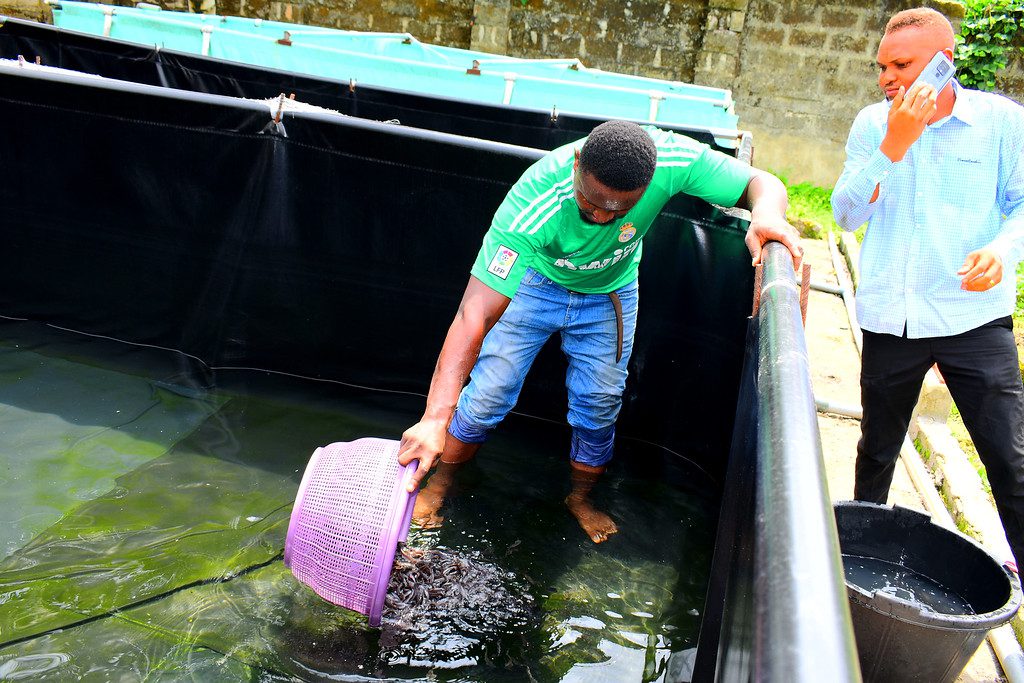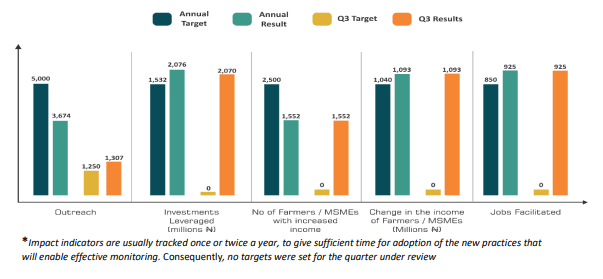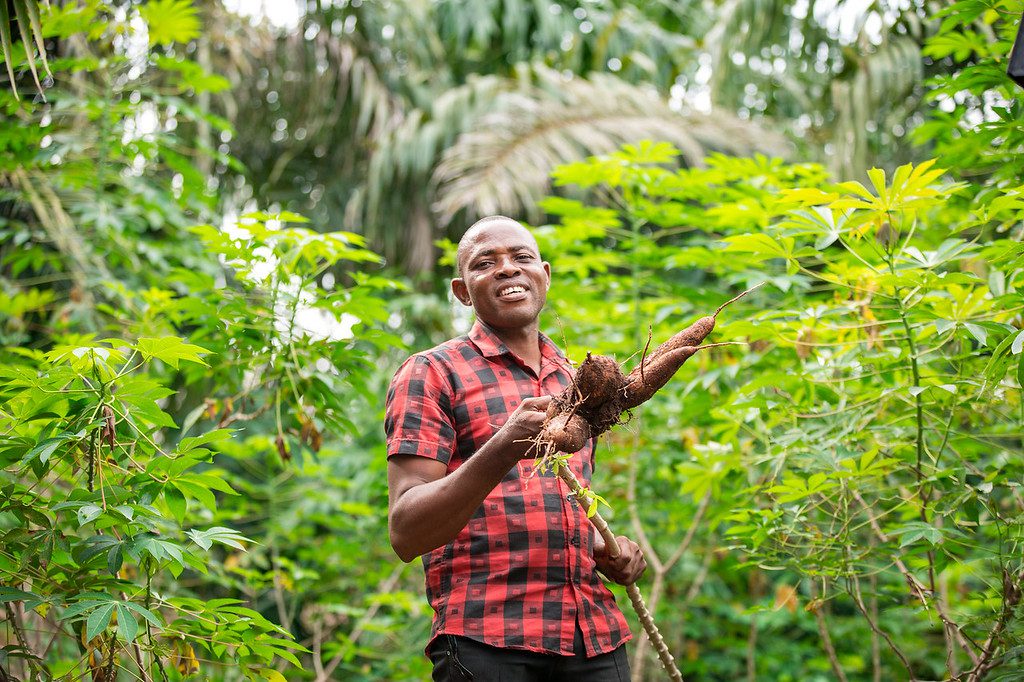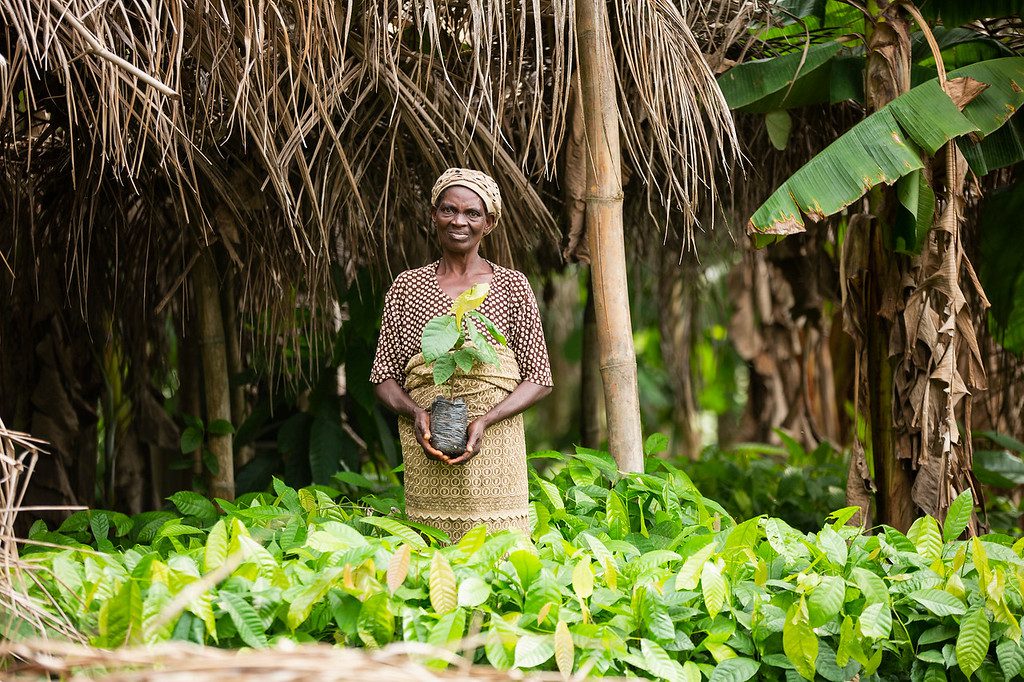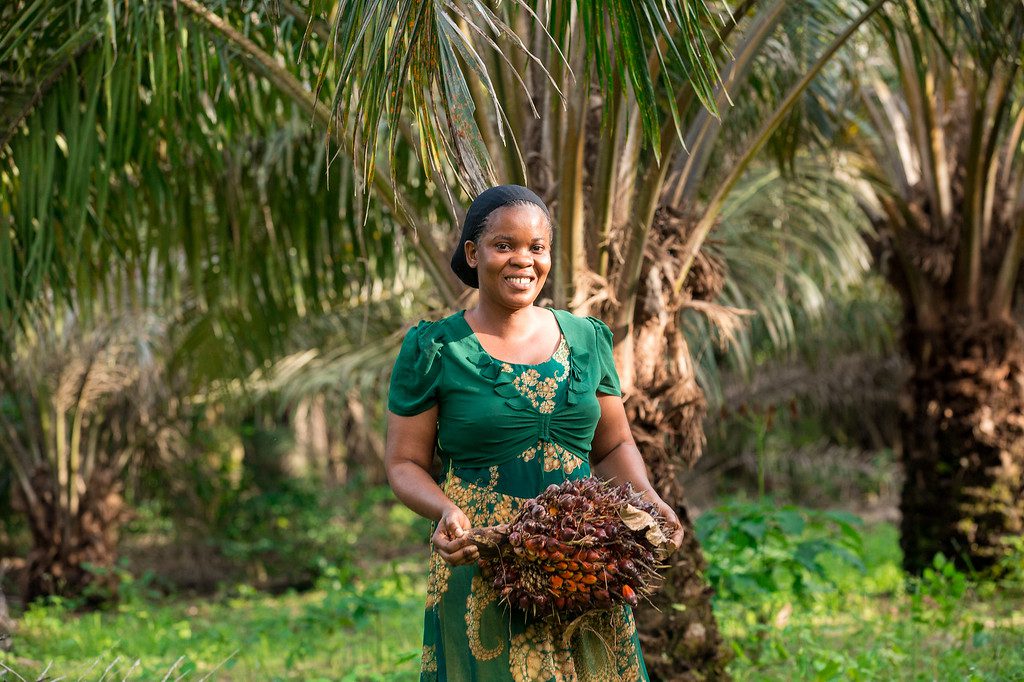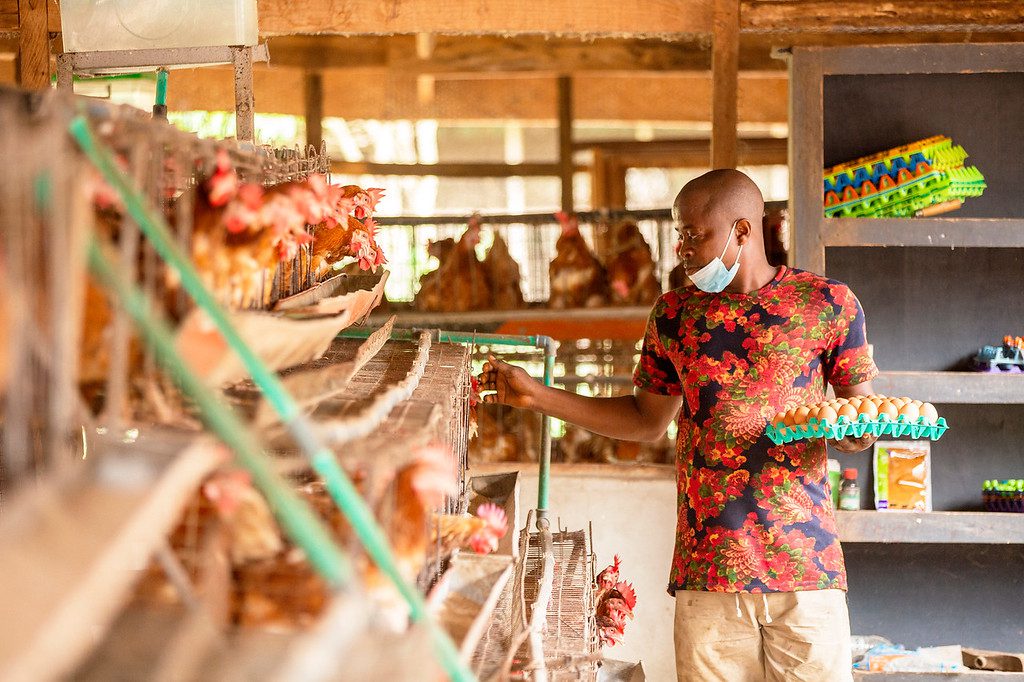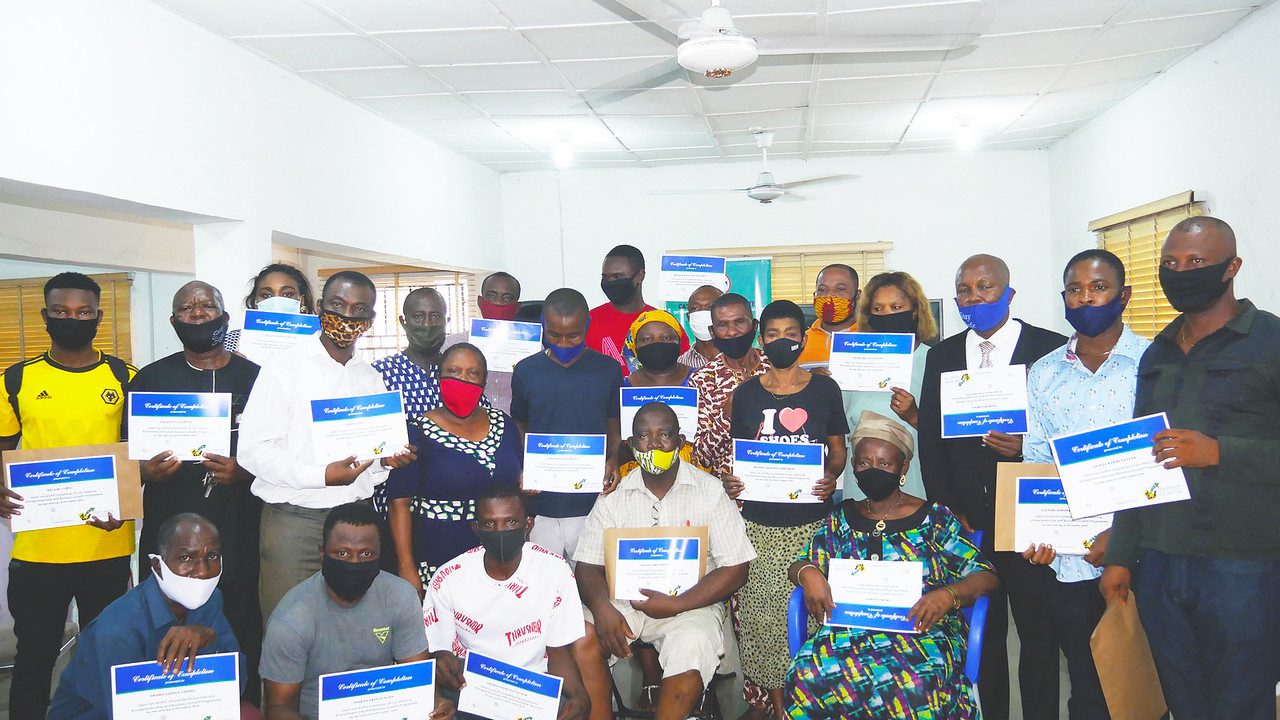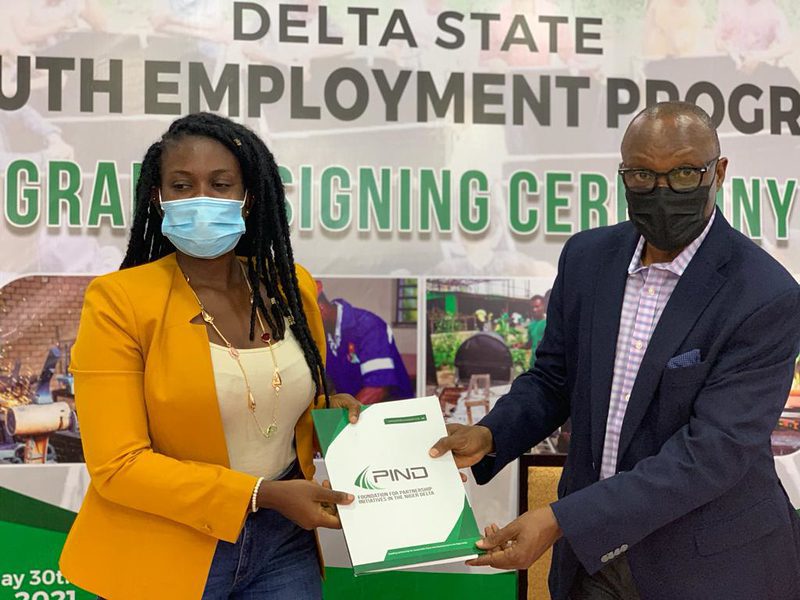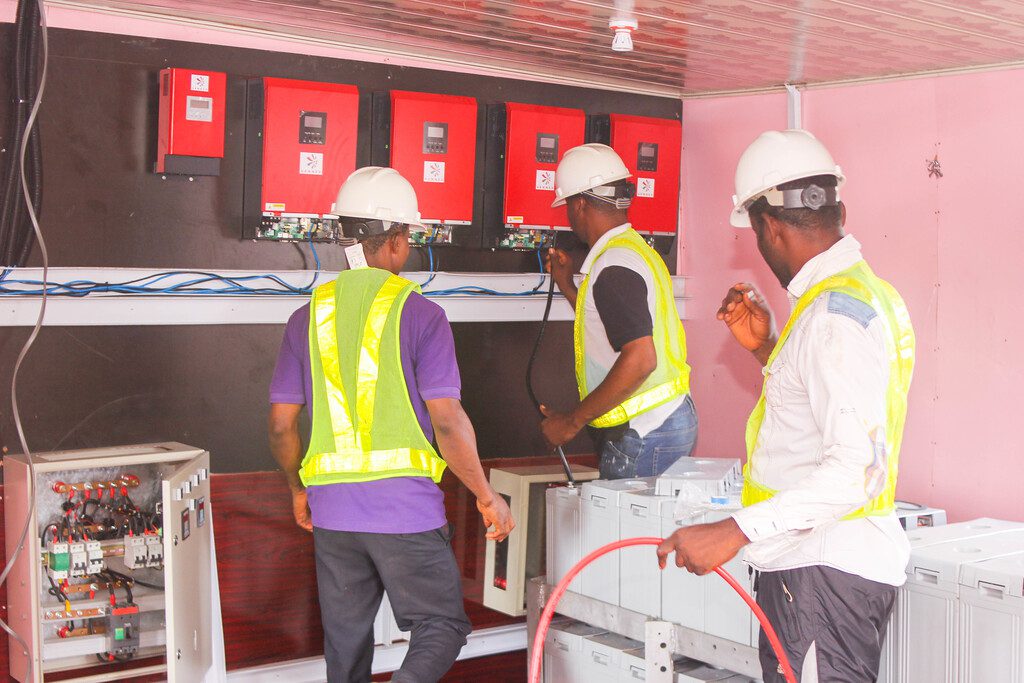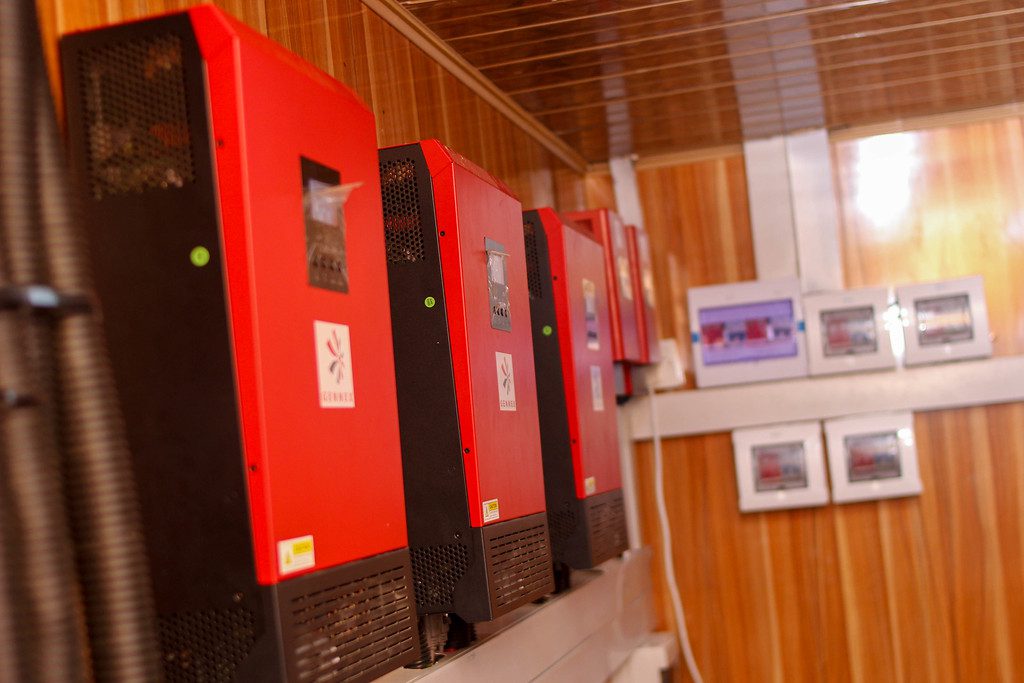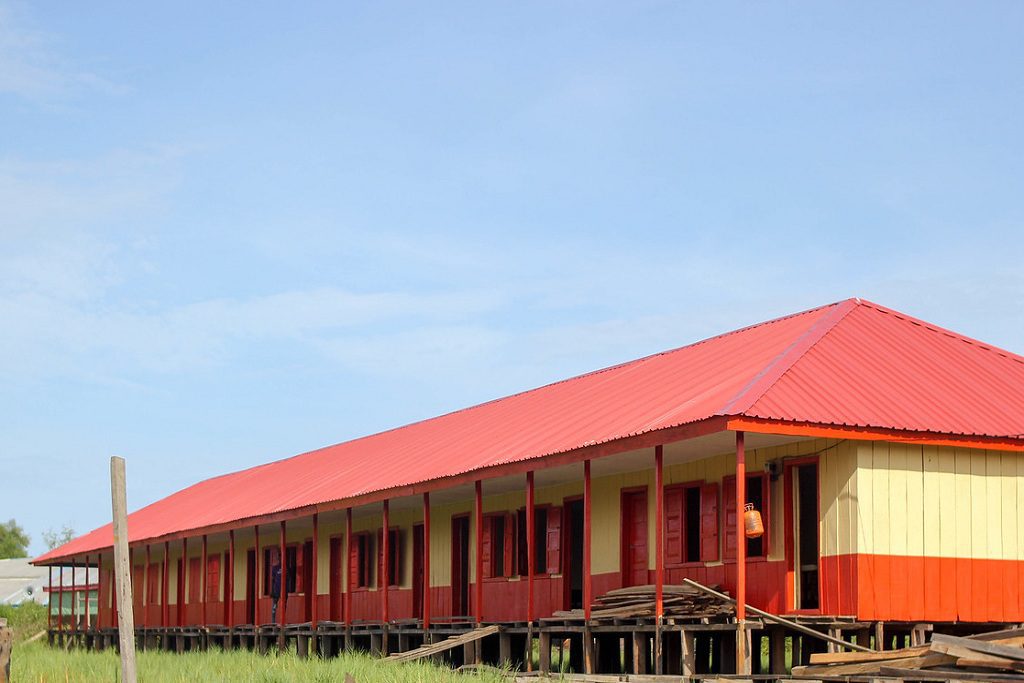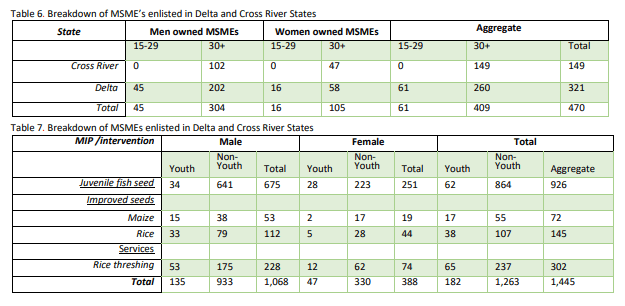PIND 2021 Q3 PROGRESS REPORT
July – September 2021
This report highlights the achievements of PIND’s program interventions in the Niger Delta from July – September 2021 (Quarter 3 of 2021), and cumulatively (Q1-Q3, 2021). It also provides relevant information about program management, lessons learned, and plans for the next quarter. The report demonstrates how PIND is driving change, to ensure broad-based economic growth in the Niger Delta.
PIND’s activities are designed to promote and sustain a culture of learning and adaptation, to build a process where evidence plays a significant role in determining policy direction and interventions in economic development, peace building, advocacy, and capacity building of both government institutions and civil society in the Niger Delta.
PIND made significant progress in its initiatives this quarter. The following are highlights of its achievements in Q3, 2021 and cumulatively (Q1-Q3, 2021):
SUMMARY OF PROGRESS
Market Systems Development
PIND’s market development projects continue to demonstrate progress towards widespread change. During the quarter, 26,038 farmers and agricultural entrepreneurs (37% women), were reached with information and knowledge on best practices and efficient technologies in the crop and non-crops sectors, making the total outreach for the period (Q1-Q3), 55,955 farmers and agricultural entrepreneurs. These farmers earned an estimated N12.5 billion in additional income in 2021 so far and enabled the creation of 8,734 full time equivalent jobs between Q1-Q3, 2021.
Economic Development
PIND incentivized private investors and participating farmers to invest N5.76 billion to implement good agricultural practices, technological innovations, purchase inputs and other capital expenditures. Majority of the investments this quarter (91%) were equity investments by these farmers in PIND’s interventions (to implement best management practices and purchase improved agricultural technology and inputs). The total funds leveraged from Q1-Q3, 2021 by these actors is N8.93 billion (N5.5 billion – Equity and N3.4 billion – debt).
Sombriero Kapital
In the GMoU communities, 15 fish processors who were screened and recommended to Sterling Bank by Sombreiro Kapital last quarter, accessed loans worth N3 million, in Q3, 2021, at an average of N200,000 per processor. The funds were given to improve the processors’ working capital and for technology upgrade. Also, 88 fish farmers received loan disbursements and input credit worth N27.1 million in Delta and Ondo states, through Sombreiro Kapital’s collaboration with input dealers and Sterling Bank. 10 smoking technologies (Chorkor ovens) were also purchased in Delta and Ondo States. A total of 36 chorkor ovens have been purchased in 2021.
Also, to support the GMoU communities, PIND trained various committees and leadership of the Regional Development Committees (RDCs) on video production and photography, gender & social inclusion and sustainable project management in Q3, 2021. These training areas were chosen to bridge the gaps identified by the Organizational Capacity Assessment (OCA) of the Regional Development Committees (RDCs) conducted in 2018.
Access to Energy
PIND also played a significant role in driving the market for low–carbon, low–cost solutions that offer high-quality energy access to coastal communities. Community–centered initiatives which PIND has championed, including the environmentally-friendly solar energy mini grids and solar–powered freezers, have addressed the challenges of energy access directly via an improved off–grid energy access to the poorest populations and businesses that operate in under-served or off-grid communities in the Niger Delta. In Q3, 2021, 126 people from 20 households and 6 businesses were provided with access to clean energy from new connections to the existing mini grid at Gbokoda community. A total of 860 people from 134 households and 56 businesses now have access to clean energy because of the operationalization of solar interventions in various communities, from Q1-Q3, 2021.
An assessment of the solar refrigerators and solar mini grid energy solutions facilitated by PIND, revealed that beneficiary households and businesses experienced a total energy cost savings of N342 million between Q1- Q3, 2021.Skills Development for Youth Employment
PIND continues to work with State governments, the private sector, and local partners to improve the quality of capacity building and vocational training and to expand access to financial services for entrepreneurs. Following the redesign of the Delta Youth Employment Program (DYEP), informed by data from the Delta State labor market assessment and the scoping study carried out in selected coastal communities, in Q3, 2021, nine organizations were selected to provide technical vocational and soft skills training to youth in four sectors: ICT, Construction, and Services. Training will commence in Q4,2021.
Peacebuilding
Shifting its strategy from growing the membership of the P4P Network to intensely activating its thousands of members/peace actors and deepening their work in peacebuilding by tackling conflict situations in their communities, PIND facilitated targeted peace building and conflict mitigation interventions to lessen the levels of conflict risk and lethal violence in the Niger Delta. In Q3, 2021, PIND produced a total of 9 weekly updates that provided a data-driven analysis of the dynamics of violent criminality and solicited the intervention of relevant stakeholders during the period. Also, PIND assisted 181 peace actors to constructively resolve emerging conflicts in various communities in the Niger Delta. This led to 35 quality actions2 being taken to mitigate conflict in different locations across the region. Consequently, data from the Peace Map (www.p4p- nigerdelta.org/peace-map) show that there was a decrease in violent criminality from 151 incidents and 366 fatalities in Q2, to 60 incidents and 121 fatalities in Q3 (60% and 67% reduction in violent criminality and fatalities, respectively) across the Niger Delta states.
Communications
By amplifying PIND’s communications efforts during the third quarter of the year, 3,337,673 people (10,217,573, so far in 2021) gained new or increased awareness about PIND, through its platforms: newsletters, social media, website, email inquiries, forums and traditional mainstream media. Also, PIND garnered 39 positive media mentions of its work and activities in the third quarter of 2021 and attracted eight (8) public endorsements from stakeholders who interacted with its content on the website, newsletters, and social media posts during the same period.
Advocacy
In addition, to ensure the sustainability of the economic development and peacebuilding interventions in the region, in Q3, 2021, the study/assessment of multiple taxation and illegal levies in the Niger Delta continued with Key Informant Interviews (KIIs) and Focus Group Discussions (FGDs) held with stakeholders in Abia, Delta, and Rivers States. Initial study findings reveal that many businesses in the region are struggling with illegal levies and multiplicity of legal taxes, which have hampered their productivity and growth. In addition, PIND held meetings with high- level government stakeholders in Delta, Edo, and Ondo States in a bid to establish committees that will help to articulate policies on access to agricultural land for smallholder farmers in the three pilot States. It is expected that these committees will move the recommendations from the high-level forum organized in Asaba in quarter one, forward and ensure that state governments develop policies that will improve access to land for agriculture in the respective States. Similarly, PIND held extensive meetings with the Ministry of Niger Delta Affairs (MNDA), culminating in an agreement on the terms of collaboration, as well as timelines for the collaborative activities, between the Ministry and PIND for setting up a Peace and Security Architecture for the Niger Delta region.
ECONOMIC DEVELOPMENT
-
As a result, 16,771 new farmers and enterprises were reached directly with information and knowledge on best practices and efficient technologies by the end of the quarter. In addition, to the direct outreach, a total of 9,265 indirect cassava farmers copied from the ‘direct’ participating farmers at a copying ratio of 1:1, making the total farmers reached to be 26,036.
-
The outcome monitoring exercise revealed that 87.3% of the farmers/MSMEs who had been reached directly by the program, adopted improved practices. Consequently, 40,746 ‘direct’ farmers/MSMEs have adopted improved practices, out of a total 46,690 farmers/MSMEs directly reached by the program from Q1-Q3, 2021.
-
The cumulative net additional (attributable) income of the adopting ‘direct’ farmers was estimated to be N12.5 billion, by Q3, 2021.
- The project facilitated 8,734 Full Time Equivalent (FTE) jobs, by Q3 2021.
- Also, within the quarter, PIND leveraged N5.76 billion from direct farmers and MSMEs investing in the adoption of intervention activities through equity/debt financing. This makes the annual funds leverage as at Q3 2021 N8.93 billion (N5.5 billion – Equity and N3.4 billion – debt), representing 102% of the 2021 annual target of N8.73 billion.
KEY ACHIEVEMENTS: AQUACULTURE
PIND’s interventions in the aquaculture sector focus on improving the efficiency and productivity of fish farmers and processors, through improved knowledge of best fish farming practices, access to improved processing technology, as well as access to quality input, market, and finance for farmers. The sector’s activities are driven by aquaculture service providers working with input companies, fabricators, and other market actors. In 2021, the aquaculture interventions plan to reach an additional 5,000 fish farmers and processors through the promotion of improved technology in the coastal communities, adoption of improved practices amongst fish farmers in the region, and facilitating access to quality fish seeds and finance for farmers and processors in the coastal communities of the Niger Delta.
In 2021, the high rate of inflation in Nigeria and the naira devaluation continued to impact the aquaculture sector. This was evidenced in the continuous rise in the cost of fish feed which constitutes over 70% of the cost of production. The cost of fish feed increased by 34% over the last eight months with a concurrent increase in the price of fish by 29%. This further increased farmers’ production costs, necessitating access to finance/input credit for farmers and more efficient farm practices.
In the quarter under review, PIND deepened its work with the network of aquaculture service providers to further create awareness on the use of quality inputs and to build the capacity of fish farmers/processors, particularly in the GMOU communities to access funds for equipment and input purchase. PIND also continued to provide support to selected hatchery operators to produce and promote quality fish seeds for farmers, in addition to overseeing and tracking the expansion of the training on good pond management and business practices to more farmers and processors, through service providers and input companies in the region.
Increasing Outreach to more farmers on pond management practices
This quarter, PIND continued to support service providers to provide pond management practices and business skill training to build the capacity of fish farmers and processors to access finance, and improve their productivity and efficiency. As a result, a total of 970 (297 Females and 673 Males) fish farmers were reached by 13 service providers. See annex 1 for details.
In addition, five (5) demonstrations to promote the adoption of improved smoking technology (smoking kiln and chorkor ovens) were carried out, reaching 184 processors in Cross River, Bayelsa, and Rivers States. Also, three demonstrations were carried out in three GMOU communities in Ondo (Awoye) and Delta (Bateren and Usor) States, reaching 153 fish processors and making the total outreach for the quarter 1,307.



KEY ACHIEVEMENTS: CASSAVA
The Cassava value chain interventions are designed to improve the productivity and incomes of actors in the cassava sector. This is achieved by incentivizing partners to invest in activities that will improve access to information and quality inputs as well as markets for cassava farmers. Since 2015, PIND has partnered with key market actors like input companies and agro-dealers to embed demonstrations and training into their marketing and sales models. These partners have continued to report increased sales because of this collaboration.
In this new strategic phase, which commenced last year, PIND continued to leverage the network of input companies, agro-dealers, Farm Service Providers (FSPs) and the Cassava Seed Entrepreneurs (CSEs) it has strengthened, to drive and expand activities in the sector to reach more farmers with information and quality agro-input.
This year, PIND’s target is to reach an additional 19,800 farmers. This will be achieved through the expansion of its work across the region, by partnering with service providers to establish demonstration plots aimed at promoting the adoption of Good Agricultural Practices (GAP) in more communities in the Niger Delta. PIND will also increasingly leverage platforms to train and increase farmers’ access to agro-inputs including stems, fertilizers, and other crop protective products, CPPs. Also, PIND will support investors to establish Cassava out-grower and aggregation programs in target locations.
In Q3, 2021 PIND continued the implementation of activities for the remainder of the main cassava planting season, while identifying and selecting partners and potential grantees for collaboration to ramp up activities in the sector in 2021, for the late planting season. PIND also intensified monitoring of CSEs trained in May as they establish multiplication plots across their various locations and step down the technical training received last quarter. With the increased rate of vaccination against Covid-19, there was an observed relaxation in COVID restrictions allowing more physical engagements involving larger numbers of people.
The project management unit of BASICS II visited PIND during the quarter for a joint review of the ongoing collaboration between PIND and BASICS II. Both organizations expressed satisfaction with the collaboration and results so far and encouraged both work teams to continue joint activities.
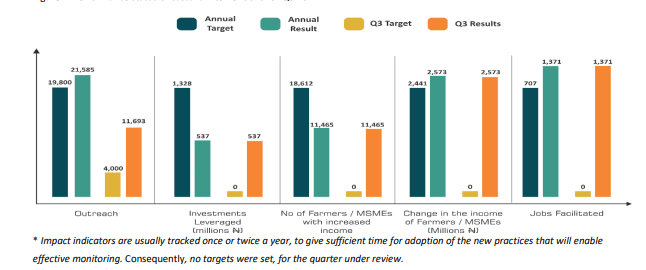


KEY ACHIEVEMENTS: COCOA
PIND’s Cocoa value chain interventions are designed to improve the productivity and income of cocoa farmers through the adoption of improved farming practices in planting/re-planting, pruning, weed management, pest and disease management, and harvest and post-harvest operations. The main intervention areas are productivity improvement and quality enhancement. To achieve this, PIND is working with business partners to invest in the promotion of good agricultural practices and technologies by providing quality agricultural information and access to quality agro-inputs and technologies to farmers. In the last two years, PIND has on-boarded and supported input suppliers, equipment dealers/promoters, output buyers (off- takers), and farm service providers to conduct a series of training programs and demonstration/promotional activities, towards stimulating the adoption of good agricultural practices and technology by farmers.
Since 2019, PIND has onboarded and partnered with 44 different support market actors12 to promote productivity improvement and quality enhancement practices and technologies among cocoa farmers. These partners have reached over 18,000 farmers with agriculture information, quality agro-inputs, and technologies in five cocoa-producing states of Abia, Akwa Ibom, Cross River, Edo, and Ondo.
In 2021, PIND’s plan is to reach a further 12,000 farmers through a series of interlinked activities aimed at deepening the solutions it has introduced and expanding them to all the cocoa-producing states in the Niger Delta. To achieve this, PIND is working with both new and existing partners to upscale the solutions in the operating year. This quarter (Q3), PIND continued to expand its outreach to more cocoa farmers by working with new and existing partners to conduct training programs and demonstrations on good agricultural practices for farmers. Also, PIND’s partnership with the Cocoa Research Institute of Nigeria (CRIN) organized its first set of training for selected nursery operators, on best nursery management practices.
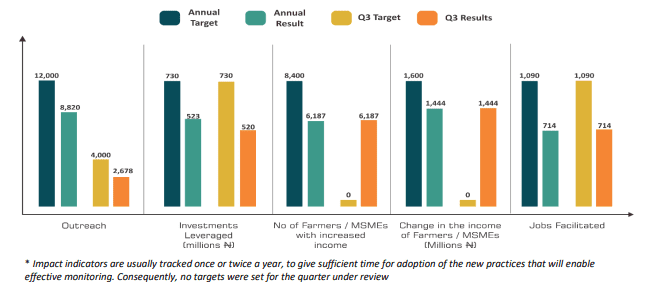


KEY ACHIEVEMENTS: PALM OIL
PIND’s interventions in the palm oil sector focus on stimulating best management practices (BMPs) among farmers and improving access to palm oil seedlings. These interventions aim to increase the productivity and income of farmers and small processors in the region. The interventions utilize the market systems development approach and are driven by agro-dealers, fabricators, input companies, and palm seed nursery operators and producers who have the incentives to provide a range of services and products that improve the productivity of farmers and processors. Previous interventions included stimulating the use of harvesting technologies and improved processing equipment.
In 2021, PIND plans to further expand its outreach in the Palm Oil sector to 14, 000 farmers, through the network of both the existing service providers whose capacity were built, and new partners. This will deepen access to improved seeds, and adoption of best management practices by farmers, individually or through oil palm business membership organizations for inclusivity. Emphasis will be on stimulating collaboration and coordination amongst different value chain actors in the sector by facilitating linkage activities to expand the field activities of the market actors.
Specifically, for the access to improved seeds intervention, PIND plans to expand its reach by strengthening the collaboration between seed producers and nursery operators in the region. It also intends to scale up the business finders’ model with new seed producers willing to increase their distribution network across the Niger Delta. Through these activities, oil palm farmers are expected to have increased access to improved and affordable seeds. In Q3, the focus was on working with intervention partners to expand intervention activities and strengthen the relationship between value chain actors in the agricultural input industry. PIND leveraged its relationships with oil palm Business Membership Organizations to onboard new farm services providers who are interested in using the BMP model to reach more farmers in the region.
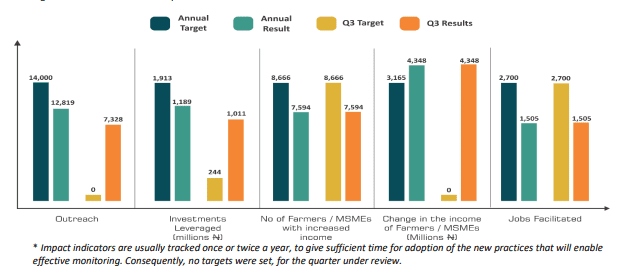


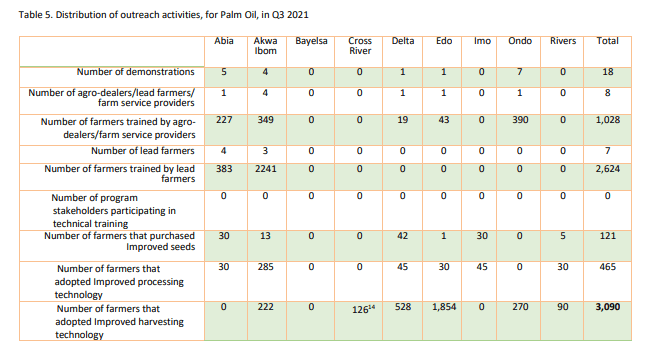


KEY ACHIEVEMENTS: POULTRY
The poultry value chain interventions are designed to improve the productivity and income of poultry farmers in the Niger Delta through the adoption of good poultry practices and linkages to quality inputs (vaccines and feeds). Other intervention activities focus on improving access to market and finance to aid the growth and expansion plans of farmers.
The sector’s activities are driven by Poultry Service Providers (PSPs) and Village Level Dealers (VLDs) working with input companies, chicken processors, and other market actors, who see the incentive to make more money by providing their services and products commercially to farmers, to improve their productivity.
PIND’s target for 2021 is to reach 7,000 farmers with information on good poultry practices (GPP), quality inputs (Vaccine and Feed) and facilitate access to market and finance in the Niger Delta region. GPP leads to a reduction in mortality and a good feed conversion ratio, meaning that farmers can have more birds at maturity and achieve the ideal 2-3kg life weight in less than eight weeks, instead of the typical 9 weeks spent; thus saving money on feed and other inputs.
In Q3, 2021, 12 additional poultry service providers (PSPs) were trained to complement the existing 32 PSPs making the total number PSPs trained by PIND, 44. PIND will continue to mentor the new PSPs and facilitate linkages between them and other actors, including farmers’ associations. PIND also began engaging day-old chick (DOC) producers to begin the process of improving access to quality DOCs to farmers. The team also facilitated linkage forums and promotional workshops aimed at linking farmers to service providers and exposing them to the importance of vaccination to chicken and egg production.
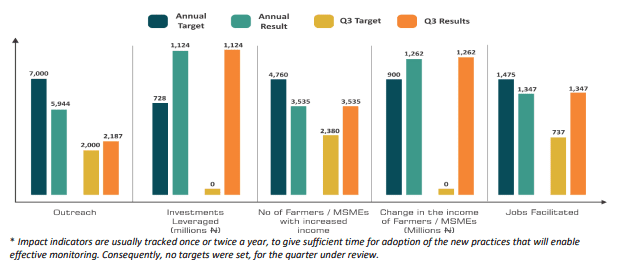


KEY ACHIEVEMENTS: MSME DEVELOPMENT AND LINKAGES
The PIND MSME Development and Linkages project aims to stimulate a market that creates a dynamic and diversified set of strong local enterprises that can meet the demand created by large buyers operating within the Niger Delta. This, in turn, strengthens the local economic environment capable of driving economic growth and job creation. The project also strengthens platforms that enable micro, small, and medium enterprises (MSMEs) to access quality business support services, market, and funding opportunities that enable enterprises to grow and be more competitive in both local and global markets.
The project activities are driven by business service providers (BSPs) strengthened by PIND, to enhance the growth of local enterprises. These BSPs work in partnership with private and public stakeholders, to organize business linkages and investment forums, as well as to access new market and funding opportunities necessary for MSME development.
In Q3 2021, PIND focused on supporting the BSPs to organize business linkages forums and clinics, provide business development services and facilitate access to finance for MSMEs through the Central Bank of Nigeria Agri-Business/Small and Medium Enterprise Investment Scheme (AGSMEIS). The scheme is an initiative to support the Federal Government’s efforts and policy measures for the promotion of agricultural businesses and small and medium enterprises as vehicles for sustainable economic development and employment creation.
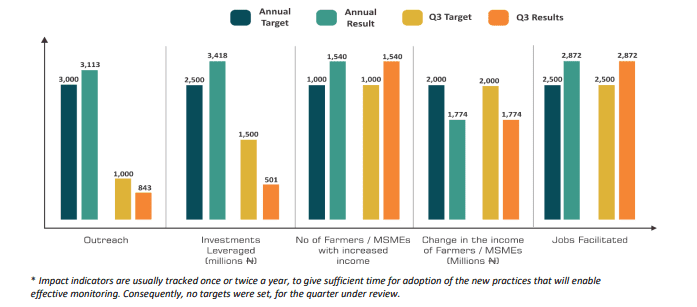


- Aquaculture
-
KEY ACHIEVEMENTS: AQUACULTURE
PIND’s interventions in the aquaculture sector focus on improving the efficiency and productivity of fish farmers and processors, through improved knowledge of best fish farming practices, access to improved processing technology, as well as access to quality input, market, and finance for farmers. The sector’s activities are driven by aquaculture service providers working with input companies, fabricators, and other market actors. In 2021, the aquaculture interventions plan to reach an additional 5,000 fish farmers and processors through the promotion of improved technology in the coastal communities, adoption of improved practices amongst fish farmers in the region, and facilitating access to quality fish seeds and finance for farmers and processors in the coastal communities of the Niger Delta.
In 2021, the high rate of inflation in Nigeria and the naira devaluation continued to impact the aquaculture sector. This was evidenced in the continuous rise in the cost of fish feed which constitutes over 70% of the cost of production. The cost of fish feed increased by 34% over the last eight months with a concurrent increase in the price of fish by 29%. This further increased farmers’ production costs, necessitating access to finance/input credit for farmers and more efficient farm practices.
In the quarter under review, PIND deepened its work with the network of aquaculture service providers to further create awareness on the use of quality inputs and to build the capacity of fish farmers/processors, particularly in the GMOU communities to access funds for equipment and input purchase. PIND also continued to provide support to selected hatchery operators to produce and promote quality fish seeds for farmers, in addition to overseeing and tracking the expansion of the training on good pond management and business practices to more farmers and processors, through service providers and input companies in the region.
Increasing Outreach to more farmers on pond management practices
This quarter, PIND continued to support service providers to provide pond management practices and business skill training to build the capacity of fish farmers and processors to access finance, and improve their productivity and efficiency. As a result, a total of 970 (297 Females and 673 Males) fish farmers were reached by 13 service providers. See annex 1 for details.
In addition, five (5) demonstrations to promote the adoption of improved smoking technology (smoking kiln and chorkor ovens) were carried out, reaching 184 processors in Cross River, Bayelsa, and Rivers States. Also, three demonstrations were carried out in three GMOU communities in Ondo (Awoye) and Delta (Bateren and Usor) States, reaching 153 fish processors and making the total outreach for the quarter 1,307.



- Cassava
-
KEY ACHIEVEMENTS: CASSAVA
The Cassava value chain interventions are designed to improve the productivity and incomes of actors in the cassava sector. This is achieved by incentivizing partners to invest in activities that will improve access to information and quality inputs as well as markets for cassava farmers. Since 2015, PIND has partnered with key market actors like input companies and agro-dealers to embed demonstrations and training into their marketing and sales models. These partners have continued to report increased sales because of this collaboration.
In this new strategic phase, which commenced last year, PIND continued to leverage the network of input companies, agro-dealers, Farm Service Providers (FSPs) and the Cassava Seed Entrepreneurs (CSEs) it has strengthened, to drive and expand activities in the sector to reach more farmers with information and quality agro-input.
This year, PIND’s target is to reach an additional 19,800 farmers. This will be achieved through the expansion of its work across the region, by partnering with service providers to establish demonstration plots aimed at promoting the adoption of Good Agricultural Practices (GAP) in more communities in the Niger Delta. PIND will also increasingly leverage platforms to train and increase farmers’ access to agro-inputs including stems, fertilizers, and other crop protective products, CPPs. Also, PIND will support investors to establish Cassava out-grower and aggregation programs in target locations.
In Q3, 2021 PIND continued the implementation of activities for the remainder of the main cassava planting season, while identifying and selecting partners and potential grantees for collaboration to ramp up activities in the sector in 2021, for the late planting season. PIND also intensified monitoring of CSEs trained in May as they establish multiplication plots across their various locations and step down the technical training received last quarter. With the increased rate of vaccination against Covid-19, there was an observed relaxation in COVID restrictions allowing more physical engagements involving larger numbers of people.
The project management unit of BASICS II visited PIND during the quarter for a joint review of the ongoing collaboration between PIND and BASICS II. Both organizations expressed satisfaction with the collaboration and results so far and encouraged both work teams to continue joint activities.



- Cocoa
-
KEY ACHIEVEMENTS: COCOA
PIND’s Cocoa value chain interventions are designed to improve the productivity and income of cocoa farmers through the adoption of improved farming practices in planting/re-planting, pruning, weed management, pest and disease management, and harvest and post-harvest operations. The main intervention areas are productivity improvement and quality enhancement. To achieve this, PIND is working with business partners to invest in the promotion of good agricultural practices and technologies by providing quality agricultural information and access to quality agro-inputs and technologies to farmers. In the last two years, PIND has on-boarded and supported input suppliers, equipment dealers/promoters, output buyers (off- takers), and farm service providers to conduct a series of training programs and demonstration/promotional activities, towards stimulating the adoption of good agricultural practices and technology by farmers.
Since 2019, PIND has onboarded and partnered with 44 different support market actors12 to promote productivity improvement and quality enhancement practices and technologies among cocoa farmers. These partners have reached over 18,000 farmers with agriculture information, quality agro-inputs, and technologies in five cocoa-producing states of Abia, Akwa Ibom, Cross River, Edo, and Ondo.
In 2021, PIND’s plan is to reach a further 12,000 farmers through a series of interlinked activities aimed at deepening the solutions it has introduced and expanding them to all the cocoa-producing states in the Niger Delta. To achieve this, PIND is working with both new and existing partners to upscale the solutions in the operating year. This quarter (Q3), PIND continued to expand its outreach to more cocoa farmers by working with new and existing partners to conduct training programs and demonstrations on good agricultural practices for farmers. Also, PIND’s partnership with the Cocoa Research Institute of Nigeria (CRIN) organized its first set of training for selected nursery operators, on best nursery management practices.



- Palm Oil
-
KEY ACHIEVEMENTS: PALM OIL
PIND’s interventions in the palm oil sector focus on stimulating best management practices (BMPs) among farmers and improving access to palm oil seedlings. These interventions aim to increase the productivity and income of farmers and small processors in the region. The interventions utilize the market systems development approach and are driven by agro-dealers, fabricators, input companies, and palm seed nursery operators and producers who have the incentives to provide a range of services and products that improve the productivity of farmers and processors. Previous interventions included stimulating the use of harvesting technologies and improved processing equipment.
In 2021, PIND plans to further expand its outreach in the Palm Oil sector to 14, 000 farmers, through the network of both the existing service providers whose capacity were built, and new partners. This will deepen access to improved seeds, and adoption of best management practices by farmers, individually or through oil palm business membership organizations for inclusivity. Emphasis will be on stimulating collaboration and coordination amongst different value chain actors in the sector by facilitating linkage activities to expand the field activities of the market actors.
Specifically, for the access to improved seeds intervention, PIND plans to expand its reach by strengthening the collaboration between seed producers and nursery operators in the region. It also intends to scale up the business finders’ model with new seed producers willing to increase their distribution network across the Niger Delta. Through these activities, oil palm farmers are expected to have increased access to improved and affordable seeds. In Q3, the focus was on working with intervention partners to expand intervention activities and strengthen the relationship between value chain actors in the agricultural input industry. PIND leveraged its relationships with oil palm Business Membership Organizations to onboard new farm services providers who are interested in using the BMP model to reach more farmers in the region.






- Poultry
-
KEY ACHIEVEMENTS: POULTRY
The poultry value chain interventions are designed to improve the productivity and income of poultry farmers in the Niger Delta through the adoption of good poultry practices and linkages to quality inputs (vaccines and feeds). Other intervention activities focus on improving access to market and finance to aid the growth and expansion plans of farmers.
The sector’s activities are driven by Poultry Service Providers (PSPs) and Village Level Dealers (VLDs) working with input companies, chicken processors, and other market actors, who see the incentive to make more money by providing their services and products commercially to farmers, to improve their productivity.
PIND’s target for 2021 is to reach 7,000 farmers with information on good poultry practices (GPP), quality inputs (Vaccine and Feed) and facilitate access to market and finance in the Niger Delta region. GPP leads to a reduction in mortality and a good feed conversion ratio, meaning that farmers can have more birds at maturity and achieve the ideal 2-3kg life weight in less than eight weeks, instead of the typical 9 weeks spent; thus saving money on feed and other inputs.
In Q3, 2021, 12 additional poultry service providers (PSPs) were trained to complement the existing 32 PSPs making the total number PSPs trained by PIND, 44. PIND will continue to mentor the new PSPs and facilitate linkages between them and other actors, including farmers’ associations. PIND also began engaging day-old chick (DOC) producers to begin the process of improving access to quality DOCs to farmers. The team also facilitated linkage forums and promotional workshops aimed at linking farmers to service providers and exposing them to the importance of vaccination to chicken and egg production.



- MSMEs
-
KEY ACHIEVEMENTS: MSME DEVELOPMENT AND LINKAGES
The PIND MSME Development and Linkages project aims to stimulate a market that creates a dynamic and diversified set of strong local enterprises that can meet the demand created by large buyers operating within the Niger Delta. This, in turn, strengthens the local economic environment capable of driving economic growth and job creation. The project also strengthens platforms that enable micro, small, and medium enterprises (MSMEs) to access quality business support services, market, and funding opportunities that enable enterprises to grow and be more competitive in both local and global markets.
The project activities are driven by business service providers (BSPs) strengthened by PIND, to enhance the growth of local enterprises. These BSPs work in partnership with private and public stakeholders, to organize business linkages and investment forums, as well as to access new market and funding opportunities necessary for MSME development.
In Q3 2021, PIND focused on supporting the BSPs to organize business linkages forums and clinics, provide business development services and facilitate access to finance for MSMEs through the Central Bank of Nigeria Agri-Business/Small and Medium Enterprise Investment Scheme (AGSMEIS). The scheme is an initiative to support the Federal Government’s efforts and policy measures for the promotion of agricultural businesses and small and medium enterprises as vehicles for sustainable economic development and employment creation.



In Q3, following advertisements for implementing and screening of potential partners to conduct technical, vocational and soft skills training under the program, 13 organizations were shortlisted across the 4 sectors for assessment to ascertain their capacity to conduct training.
On completion of the capacity assessment, nine organizations which met the basic requirements were recommended for grant awards following which site inspection of their facilities took place, including the organizations’ ability to comply with COVID-19 guidelines. Four of these organizations had worked with PIND under the NDYEP project. all nine organizations will train at least 595 youth (including those from the GMOU communities) across the four sectors. A total sum of N71,130,200 was also approved as grants to the nine implementing partners.
Private Sector Engagement
In Q3 also, a workshop was organized to strengthen the existing relationship between DYEP and the organized private sector in the state (Warri and Asaba Chambers of Commerce, Industry, Mines and Agriculture). In participation also were government and private technical and vocational education centers (TVETs), tech hubs, agricultural organizations and some private companies. The aim of the workshop was to bring together strategic private sector actors and players in the youth employment ecosystem in the state, to share ideas about the DYEP intervention to learn about their organizations and TVETs.
The coastline rural communities in the Niger Delta region of Nigeria suffer poor rural electrification. Many of these communities do not have access to regular electricity supply to power basic economic assets and household needs, thereby reducing economic activities in them. Expectations for connection to the National grid anytime soon is unlikely due to high-cost implications and the difficult terrains. Since 2018, PIND has been addressing this gap through alternative and affordable off-grid solutions, capable of targeting not only basic energy needs (i.e., lighting and cooking energy), but also productive use of energy at both household and rural enterprise levels (such as use in barber shops and beauty salons.
In Q3 2021, 26 additional connections- 20 households and 6 businesses) were recorded on the existing mini grid at Gbokoda. Also, 73 persons participated in various PIND-supported demonstrations and workshops on Access-to-Energy technologies.
Outreach
PIND’s Access to energy program had an outreach of 199 persons in Q3 2021. These are the 73 participants who attended the two PIND organized events to promote optimization of the solar mini grid interventions, and 126 people from 20 households and 6 businesses, with access to clean energy solutions from the new connections to the existing mini grid at Gbokoda community. Cumulatively in 2021 so far, 134 households and 56 businesses and thus a total of 860 persons, now have access to clean energy because of the operationalization of solar interventions in various communities.
Preventing postharvest losses through access to solar refrigeration hubs
In Q3 2021, PIND carried out a survey of the solar refrigeration interventions in Sangana and Fishtown communities in Bayelsa state. The survey reveals that fish traders are the key actors who have been positively affected by the intervention. The adoption of the technology has had a significant effect on the dynamics of the local fish trading regime with a knock-on effect on the seagoing fishing vessel business (since the traders are the vessel owners). The technology has eliminated an estimated 8kg daily of postharves losses for the cooperative members. With losses eliminated, these farmers, increased the daily quantity of fish they harvest by an average of 10kg per cooperative member. Also, these traders increased the daily quantity of fish they preserve by 18kg, since the adoption of solar refrigerators.
With eight days of purchasing or harvesting fish each month, additional income for the 252 members of the cooperatives in Sangana and Fishtown, using the facilities in Bayelsa state from Q1-Q3, 2021 is N329,576,846.76, at an average additional income of N145,316 per trader, each month.
The impact of solar mini grids on livelihoods and welfare in the coastal communities
Results of the outcome assessment of solar mini grids facilitated by PIND suggest that in 2021 alone, the interventions in four coastal communities Gbokoda& Ogheye (both in Delta State) and Molutehin & Gbagira (both in Ondo State) have unlocked a significant amount of capital through savings for coastal businesses and in some cases households. The assessment showed that 85% (221) of the 272 households and businesses which connected to the solar mini grids in these communities experienced cost savings, resulting from reduced energy costs (use of generators in particular). Beneficiary households and businesses in Molutehin and Gbagira communities of Ondo State reportedly saved an average of N11,286 on energy costs each month, while beneficiary households and businesses saved N6,407 each month. The total cost savings for these 221 households and businesses, across the four communities, is N12,326,733, for Q1-Q3, 2021.
Optimizing access to energy for businesses and households through the adoption of Productive use equipment
In Q3, 2021 PIND had a community stakeholders engagement meeting with leaders and members of Kpokugbene community, Warri North LGA, Delta State. Kpokugbene community was nominated by the EGCDF to CNL PGPA as one of two options for a proposed grant funded energy cabin, and PIND’s stakeholder meeting was designed to further engage the stakeholders in view of the planned implementation. Seven women and 17 men representing the leadership and key stakeholder groups within the community participated in the meeting to discuss various aspects of the project such as communal night-time lighting. Additional noted above 26 were recorded on the existing solar mini grid at Gbokoda, which is consistent with the forecast for increase business and household demand for electricity.
Increasing women economic power through access to energy goods and services
PIND’s gender programming in energy also reflects the efforts at mainstreaming access to energy. The various surveys suggest that 60% of the solar refrigeration users are between the ages of 20 – 40 years, while a high percentage of the beneficiaries (78%) are females. Similarly, 45% of the beneficiaries of the community mini grids are women and women headed households. This underscores a conscious programming that deliberately targets the youth and women through participation in local economic development sectors that “leaves no one behind” principle of the SDG.
PEACEBUILDING | IN THE NIGER DELTA
This section highlights key achievements of the Peace Building program for Q3, 2021.
Since 2012 PIND has embarked on extensive interventions in conflict prevention, conflict management and peacebuilding in the region. PIND’s role in and its support for grassroots-led conflict resolution initiatives are examples of both the scope and the limits of long-term peacebuilding projects. Recognizing the need for an integrated and comprehensive approach to tackling the complex causes and drivers of conflict in the region, PIND adopted a plan of action that aimed to keep the level of violence as low as possible, particularly in key communities of interest, while also building the social infrastructure and social capital of peace actors across the region for long term sustainable peace. This ushered in a paradigm shift reflecting a different way of working on problems of militancy, election violence, gang/cult violence, communal violence, and the cross-cutting issue of Violence Affecting Women and Girls (VAWG)20.In the 2020-2024 strategic cycle, PIND’s objective is to positively affect up to 10% of the Niger Delta population through its peacebuilding interventions by enabling active engagement of 5,000 peace actors in conflict mitigation and reduction.
In Q3, the Peacebuilding Program carried out a series of targeted peace building and conflict mitigation interventions to mitigate the levels of conflict risk and lethal violence in the Niger Delta. As part of these targeted interventions, the Program trained 129 community-based field monitors to report incidents of conflict risk and violence to the integrated Early Warning and Early Response (EWER) platform to aid proactive responses. The program also produced weekly conflict briefs and a quarterly conflict report to update stakeholders and facilitate interventions to mitigate prevailing and emerging conflict issues in the region. These interventions by PIND’s Peacebuilding Program, together with interventions by similar and complementary programs, resulted in a significant reduction in the level of violence and conflict fatalities during the quarter compared to Q2.
According to data from the Peace Map (www.p4p- nigerdelta.org/peace-map ), there was a decrease in violent criminality from 151 incidents and 366 fatalities in Q2, to 60 incidents and 121 fatalities in Q3 (60% and 67% reduction in violent criminality and fatalities, respectively) across the Niger Delta states. PIND produced a total of 9 weekly updates in Q3 that provided a data-driven analysis of the dynamics of violent criminality and solicited the intervention of relevant stakeholders during the period.
Similarly, there was a reduction in the level of violence and conflict fatalities caused by ethno- national separatist agitation during the quarter. Following a resurgence of violent separatist agitation in Q2, PIND and the P4P network intensified efforts towards updating stakeholders with weekly situation reports and data analysis, and mobilized peace actors through the P4P network for targeted conflict mitigation and peace messaging in Abia and Imo States. These contributed to the reduction in violence and conflict fatalities related to the separatist agitation in the region. For instance, there was a decrease in violent agitation from 25 incidents and 86 fatalities in Q2, to 13 incidents and 26 fatalities in Q3. At the community level, there was also a decrease in inter- and intra-communal conflicts over land and boundary disputes from 13 incidents and 49 fatalities in Q2 to 8 incidents and 8 fatalities respectively in Q3.
Development Initiative for Community Impact (DICI) Intervention
- The “Promoting Social Cohesion through mitigating of Conflict Drivers in the Coastal Community of Aja- Amita” project was implemented to reduce community leadership conflict. Key stakeholders such as the Trust Management Committee executive, youth groups, community-based organizations and the Itsekiri Regional Development Council were engaged. Other key activities implemented were training workshops on conflict transformation and resolution, EWER, conflict sensitivity and community peacebuilding; dialogue sessions and advocacy visits to relevant stakeholders.
Women now part of Aja-Amita Decision Making Body
- In many African societies, women are often seen but not heard,. Nigeria remains a largely patriarchal society, where structural and gender inequalities ensure that men dominate the private and public spheres and hold positions of power. Women are in many instances relegated to the background with diminished agency and decision-making power in the economic, reproductive and social arenas (ICRW, 2020).Aja-Amita community, in Warri North of Delta State, is not left out in women exclusion in decision making bodies. This was revealed when Development Initiative for Community Impact (DICI) began implementing a conflict mitigation intervention in the coastal community using PIND’s small grant support. Findings show that women were side-lined and hushed whenever they sought to ask for inclusion in decision making structures.Through advocacy, DICI requested the elders to nominate women to be part of the Aja-Amita Inclusive Peace Committee (AIPC). The elders granted the request, and seven women were nominated as members of the 15-person AIPC. The women are elated and are now actively contributing to decision making concerning peacebuilding and community development issues.
Center for Peace and Environmental Justice Intervention
- Aside from building the capacity of the Tsekelewu youths on peace building and conflict management, the “Strengthen Tsekelewu Community Leadership System to Support Conflict Mitigation” project’s specific objective was to reduce leadership conflicts and establish peaceful transition of power within the Tsekelewu youth groups. The youth leadership conflict began in 2017 which led to the community being split into factions. Youth groups, women associations, community women, elders, Community Development Committees (CDCs), Community-Based Organizations (CBOs), national and community leaders of thought were engaged in town hall meetings, dialogue and roundtable discussion sessions, sensitization events as well as training activities.
